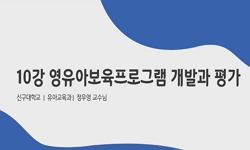The purpose of this study is to examine the influence of infant`s temperament perceived by teachers and teacher`s self-efficacy on the interaction between teachers and infants. Seventy eight infants. aged from 12 months to 30months, and their teachers...
http://chineseinput.net/에서 pinyin(병음)방식으로 중국어를 변환할 수 있습니다.
변환된 중국어를 복사하여 사용하시면 됩니다.
- 中文 을 입력하시려면 zhongwen을 입력하시고 space를누르시면됩니다.
- 北京 을 입력하시려면 beijing을 입력하시고 space를 누르시면 됩니다.
보육교사가 지각하는 영아의 기질과 교사효능감이 교사와 영아 간의 상호작용에 미치는 영향 = The Effect of Infant`s Temperament perceived by Teachers and Teacher`s Self-Efficacy on the Interaction between Teachers and infants
한글로보기https://www.riss.kr/link?id=A82758460
- 저자
- 발행기관
- 학술지명
- 권호사항
-
발행연도
2010
-
작성언어
-
- 주제어
-
KDC
500
-
자료형태
학술저널
-
수록면
113-122(10쪽)
- 제공처
-
0
상세조회 -
0
다운로드
부가정보
다국어 초록 (Multilingual Abstract)

The purpose of this study is to examine the influence of infant`s temperament perceived by teachers and teacher`s self-efficacy on the interaction between teachers and infants. Seventy eight infants. aged from 12 months to 30months, and their teachers participated in this study. Revised Infant Temperament Questionnaire(RITQ) was used to evaluate infant`s temperament perceived by Teachers, and the Science Teaching Efficacy Belief Instrument(STEBI) was used to evaluate teacher`s Self-Efficacy. A scale for Interaction between Teacher and Early Children among the early childhood program was used to evaluate interaction between teachers and infants. The results of this study were as follows. First, the infant`s rhythmicity and persistence, and threshold affected the teacher`s self-efficacy. Second, there was a significant negative relationship between the rhythrnicity and teacher`s linguistic modeling. Finally, in terms of the effect of the individual teacher`s self-efficacy, interaction between teachers and infants showed the different affects according to the Leather`s self-efficacy.
동일학술지(권/호) 다른 논문
-
한국 대기업의 소비자지향적 기업황동에 대한 소비자와 기업종사자의 인식 비교
- 성균관대학교 생활과학연구소
- 김기옥
- 2010
-
- 성균관대학교 생활과학연구소
- 김기옥
- 2010
-
- 성균관대학교 생활과학연구소
- 이성림
- 2010
-
- 성균관대학교 생활과학연구소
- 강현수
- 2010




 KISS
KISS






